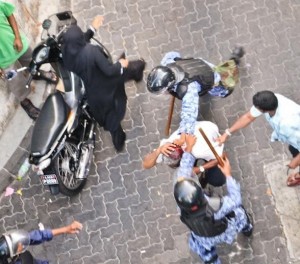No additional reporting by missing journalist Ahmed Rilwan
Today’s hearing into the alleged assault of Mahchangolhi Uthuru MP Mariya Didi has been cancelled after the defendant’s failure to attend court.
Police officer Ibrahim Faisal is accused of assaulting the Maldivian Democratic Party (MDP) MP during the demonstration held on February 8, 2012, following the controversial change of power on February 7.
The MDP maintains the transfer of power to was an illegal, with the resignation of former President Nasheed having come under duress.
The hearing was cancelled today (October 12) when the accused failed to attend despite having received a summons sent to police headquarters.
The Criminal Court has rescheduled the hearing to be held on October 19. Mariya Didi confirmed to Minivan News that she has received summons from the Criminal Court to be present at the newly scheduled hearing.
Faisal has previously denied the charges against him, although another police officer has given a witness statement supporting the assault claims against Faisal.
Following the cancellation of today’s hearing, Mariya Didi held a press conference during which she expressed concern that the accused is allowed to continue working without suspension despite the serious charges lodged against him.
She said that she was worried about her safety after having appeared in court to testify against the officer.
“The man that the prosecutor general is prosecuting with evidence still remains in his position at work. And as I saw on that day, it was not just one individual police officer who assaulted me,” Mariya told the press.
“On both February 7 and 8 they attacked me as a group. Based on this, I am worried about the fact that he [Faisal] gets to stay on in his job,” she added.
Previous investigations into the events of February 8 by the Human Rights Commission of Maldives stated that the police crackdown of MDP supporters marching on February 8 was “brutal” and “without prior warning”.
An HRCM team visiting the MP while in detention after the February 8 march observed “bruises all over [Mariya’s] body and her eyes bloodied and swollen”.
In its concluding observations, the commission concluded that police officers “acted very harshly” towards the politicians “in ways that could cause physical and psychological harm” despite their having been no resistance on the part of the politicians.
Amnesty International also documented the assaults on both Mariya and fellow MDP MP Eva Abdulla in its September 2012 report titled, ‘The Other side of Paradise: A Human Rights Crisis in the Maldives’.
The Criminal Court is also separately looking into a case of alleged brutality on MP ‘Reeko’ Moosa Manik by police officer Mohamed Waheed of RosyVilla in Gaafu Dhaalu Atoll Thinadhoo.
In 2013, Amnesty released a statement saying that failure to prosecute police officers accused of human rights abuses and serious failings in the justice system entrenched impunity.
Commonwealth-backed Commission of National Inquiry – established by then President Mohamed Waheed to investigate the transfer of power – had taken note of “allegations of police brutality and acts of intimidation”, calling for “investigations to proceed and to be brought to public knowledge with perpetrators held to account”.
Speaking in parliament on August 6, Attorney General Mohamed Anil stated that five cases involving four police officers accused of committing acts of brutality in February 2012 were ongoing at the Criminal Court.
